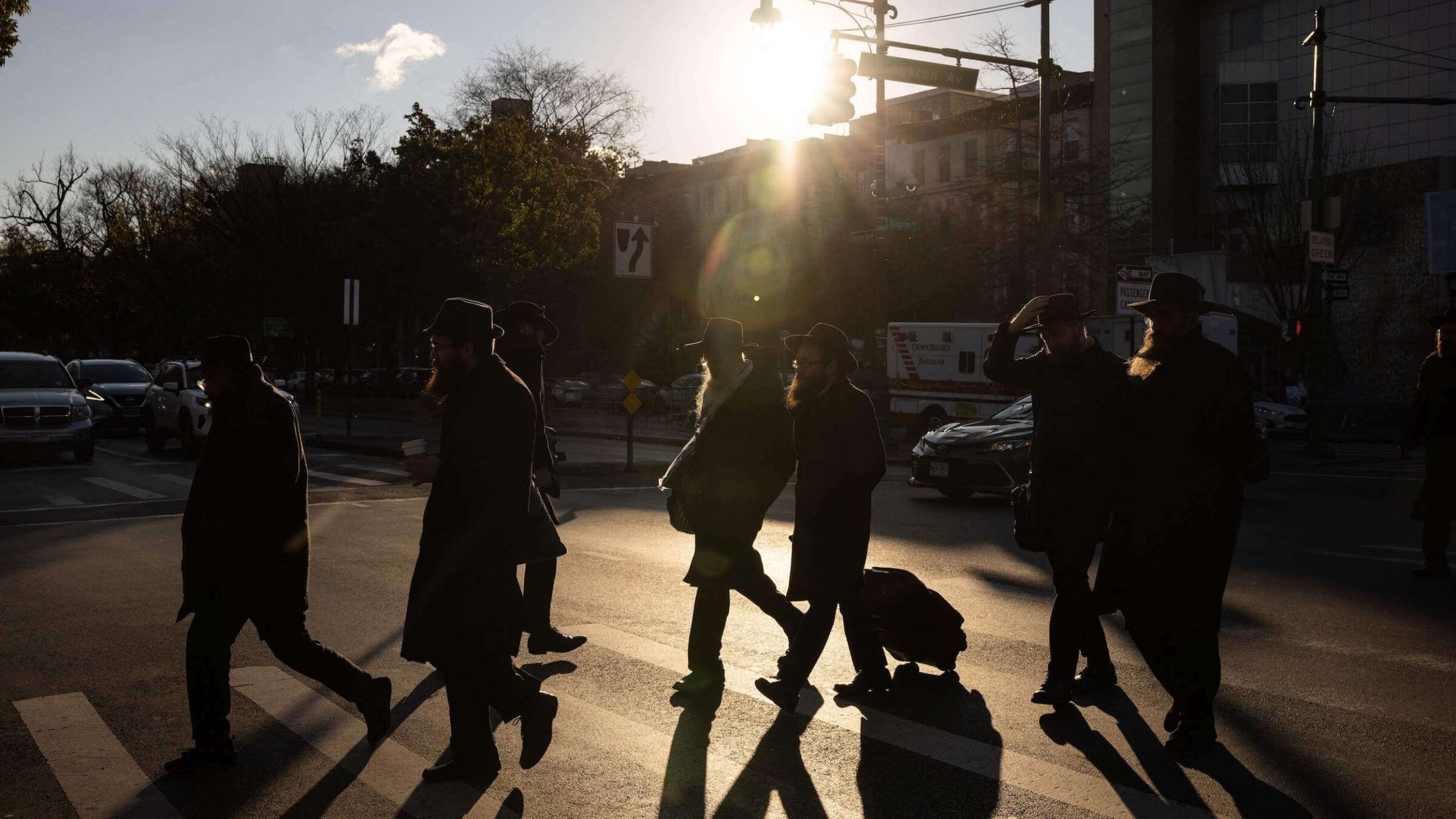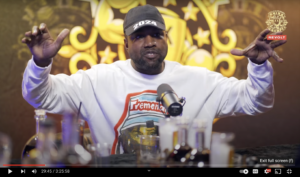The 18 biggest Jewish stories of 2022
Antisemites came out of the shadows this year — as did Jewish heroes

Rabbis attending the International Conference of Chabad Lubavitch Emissaries in New York City on November 20, 2022. Photo by YUKI IWAMURA/AFP via Getty Images
Antisemitism wasn’t the only big Jewish news this year, but it did dominate much of the Jewish discourse.
Physical attacks against Jews increased amid a rising cacophony of antisemitism on the airwaves and social media. The story was too big and complex for just one spot on our list of the top Jewish stories of 2022 — we gave it three, and it touched several others.
This year was also one of political upheaval. Elections and court decisions in the U.S. and Israel set Jews on edge and spurred them to protest. Jewish institutions, accused of sexism, racism and homophobia, were called to account. Some resisted. Others apologized.
It was also a year of Jewish heroes. The rabbi who foiled the gunman threatening to kill his congregants in Colleyville, Texas. The Ukrainian president who united his people against a Russian invasion. The Shabbat-observant yeshiva grad who dreamed of playing in the NBA — and took unprecedented steps toward doing so.
Here, in no particular order, is the Forward’s list of the 18 top Jewish stories of 2022. It is neither exhaustive, nor is it presented in any particular order. How does it compare to your list? Let us know: Email [email protected].

1. Antisemitic assaults and abuse. Physical attacks on Jews, antisemitic vandalism and hate crimes fueled by antisemitic conspiracy theories spiked across the nation. Lufthansa removed scores of Hasidic Jews from a flight because a few weren’t following masking rules. After Elon Musk bought Twitter and scrapped the teams that police hate speech, antisemitism on the platform soared. And the suspect in the fatal shootings of 10 Black people in Buffalo was found to have authored a screed detailing his hatred toward minorities that was rife with antisemitic conspiracy theories — illustrating how closely connected antisemitism can be to other forms of racial hatred.
2. Celebrity antisemitism. Rapper Kanye West’s rambling antisemitic tirades cost him business deals, but also drew praise from conspiracy-minded fans, and gave antisemites new fuel: One suspect in an antisemitic assault yelled “Kanye 2024,” and an antisemitic hate group hung banners over an LA highway claiming “Kanye was right.” NBA player Kyrie Irving tweeted a link praising an antisemitic film and took weeks to apologize. Comedian Dave Chappelle riffed on both the rapper and the player on Saturday Night Live, and left Jews wondering whether they had been defended or insulted.
3. The Shabbat hostages. An armed British citizen, who believed conspiracy theories about Jews controlling the government and wanted a terrorist released from prison, took Rabbi Charlie Cytron-Walker and three congregants hostage at their Texas synagogue on a Shabbat morning in January. After 11 hours, when Cytron-Walker feared the gunman was ready to kill them, he threw a chair to create a distraction that allowed all the hostages to flee.

4. Roe in ruins. Jews across the political spectrum rejected the Supreme Court decision striking down Roe v. Wade. Jewish groups protested and promised both to fight for abortion rights in individual states and work toward enshrining them in a new national law. And a Chicago rabbi revived a clandestine abortion network founded by a Jewish woman pre-Roe.
5. An international Jewish hero. Before Ukrainians elected him as their first Jewish president, Volodymyr Zelenskyy was a television comedian who once triumphed on the Ukrainian version of Dancing with the Stars. When Russia invaded Ukraine he donned drab olive T-shirts and combat boots, coming to personify a beleaguered but defiant democracy that has managed to reclaim much of the land taken by Vladmir Putin’s army. For his strength and courage, Time magazine made him its person of the year.
6. Highland Park parade massacre. The gunman who opened fire at a Fourth of July parade in the Chicago suburb of Highland Park is not believed to have targeted Jews, but most of the seven people he killed were Jewish or part of Jewish families. Among them: a Russian-Jewish emigree and the bar and bat mitzvah coordinator at a synagogue in a neighboring town.

7. New scrutiny on Trump’s ties to antisemites. In the middle of Kanye West’s antisemitism-spewing tour, former president Donald Trump hosted him for dinner. West brought along white nationalist Nick Fuentes, prompting widespread outrage and leading even some Trump’s allies, including several prominent Jewish Republicans, to call him out. Trump in response questioned American Jews’ loyalty and scolded them for failing to appreciate his support for Israel.
8. Midterm madness. Several candidates in key races, including for Pennsylvania governor, allied with antisemites and trafficked in antisemitic tropes. Orthodox Jews came out in force for New York state gubernatorial candidate Lee Zeldin, a Jewish Republican, but couldn’t push him over the top. And after redistricting pitted him against a longtime Democratic colleague, Rep. Jerrold Nadler won a tight primary and will keep his status as the leader of the U.S. House’s informal Jewish caucus.
9. AIPAC’s endorsements. The pro-Israel lobby faced criticism for endorsing more than 100 Republicans who refused to certify the 2020 presidential election, in a sign that the landscape of Jewish political advocacy is shifting. AIPAC was also criticized for helping to fund primary candidates it deemed more staunchly pro-Israel than their Democratic rivals — even when those rivals were incumbents.

10. Netanyahu’s return. The fifth Israeli election in two years restored Benjamin Netanyahu’s coalition to power, a coalition that this time includes extreme-right figures who will hold influential offices. On a U.S. visit, Netanyahu tried to assure worried American Jews that he won’t let his coalition partners turn Israel into a theocracy or exacerbate the Israeli-Palestinian conflict.
11. LGBTQ@YU. Yeshiva University, the flagship Modern Orthodox institution of higher education, refused to recognize the YU Pride Alliance, citing prohibitions in Jewish law. The group sued, and a New York state trial court judge agreed that the school had to abide by city anti-discrimination laws. YU appealed to the U.S. Supreme Court, which held that the school had yet to exhaust its lower court options. Back in the lower courts, judges have so far again ruled in favor of the students.

12. Russia invades Ukraine. Jewish organizations sent aid and volunteers to Ukraine, home to the 12th-largest Jewish community in the world, and Russian Jewish oligarchs were among those targeted with sanctions. Israel welcomed Ukrainian Jews fleeing the conflict, but also restrained its criticism of Russia, having long counted on the country to help keep hostile forces in neighboring countries in check. Still, Russia moved to shut down the Jewish Agency in Russia, which helps Jews emigrate to Israel, and more firmly allied with Iran, putting its relationship with Israel in new jeopardy.
13. Reckonings with sexual harassment. Jewish groups grappled with sexual harassment scandals, with the Union for Reform Judaism release of a report detailing the ways in which its congregational arm in past decades enabled the sexual abuse of children by clergy and summer camp employees. And the board of the Jewish Orthodox Feminist Alliance was accused of failing to act when an employee alleged that its president bullied and made sexually inappropriate comments to a colleague.
14. Madame Ambassador. After eight months of delays and a contentious hearing, the U.S. Senate confirmed Deborah Lipstadt, the renowned Holocaust historian, as the State Department’s envoy to combat and monitor antisemitism. Lipstadt is the first person in the job since it was elevated to the rank of ambassador. Republicans who held up her confirmation critiqued her social media activity, including one tweet in which she accused a GOP senator of embracing white supremacy.

15. Ice cream and apartheid. Critics of Israel’s treatment of Palestinians made headlines with the release of an Amnesty International report that accused Israel of apartheid, and Ben & Jerry’s refusal to sell ice cream in the occupied West Bank reverberated in boardrooms and state governments. Defenders of Israeli policy said the Amnesty report was full of distortions and held the country to a higher standard than others, while Ben and Jerry’s stance faced opposition from its parent company, Unilever, which then arranged for sales to continue through a third party. Several states then acted on laws aimed at punishing companies that boycott Israel by barring them from state contracts and pension funds, and a U.S. appeals court upheld those laws.
16. Yeshivas under fire. A New York Times investigation documented the widespread failure of yeshivas, which are often supported with public funds, to educate children in secular subjects. Hasidic leaders blasted the story as unfair and biased, while rumors swirled over how the Times arranged for its report to be translated into Yiddish. Days later, a New York state board approved new rules to force yeshivas and other private religious schools to offer basic secular instruction.
17. Demise of the Iran nuclear deal. For much of the year, it looked as if the White House might secure a deal to slow Iran’s development of a nuclear weapon, reviving an agreement passed by Congress under former President Barack Obama and scuttled by former President Donald Trump. But the deal faced overwhelming obstacles, and negotiators’ enthusiasm waned after Iran cracked down on domestic protestors and sold weapons to aid Russia’s war in Ukraine.
18. Hebrew hustle. College basketball phenom Ryan Turell, Yeshiva University class of 2022, led the nation in scoring and then declared for the NBA draft. He went unselected, but then the Detroit Pistons’ minor league affiliate, the Motor City Cruise, picked him in the NBA G League draft. He still aims to be the first Orthodox Jew in the NBA.
The Forward is free to read, but it isn’t free to produce

I hope you appreciated this article. Before you go, I’d like to ask you to please support the Forward.
Now more than ever, American Jews need independent news they can trust, with reporting driven by truth, not ideology. We serve you, not any ideological agenda.
At a time when other newsrooms are closing or cutting back, the Forward has removed its paywall and invested additional resources to report on the ground from Israel and around the U.S. on the impact of the war, rising antisemitism and polarized discourse.
This is a great time to support independent Jewish journalism you rely on. Make a gift today!
— Rachel Fishman Feddersen, Publisher and CEO
Support our mission to tell the Jewish story fully and fairly.
Most Popular
- 1

Culture Cardinals are Catholic, not Jewish — so why do they all wear yarmulkes?
- 2

Fast Forward Ye debuts ‘Heil Hitler’ music video that includes a sample of a Hitler speech
- 3

News School Israel trip turns ‘terrifying’ for LA students attacked by Israeli teens
- 4

Fast Forward Student suspended for ‘F— the Jews’ video defends himself on antisemitic podcast
In Case You Missed It
-

Yiddish קאָנצערט לכּבֿוד דעם ייִדישן שרײַבער און רעדאַקטאָר באָריס סאַנדלערConcert honoring Yiddish writer and editor Boris Sandler
דער בעל־שׂימחה האָט יאָרן לאַנג געדינט ווי דער רעדאַקטאָר פֿונעם ייִדישן פֿאָרווערטס.
-

Fast Forward Trump’s new pick for surgeon general blames the Nazis for pesticides on our food
-

Fast Forward Jewish feud over Trump escalates with open letter in The New York Times
-

Fast Forward First American pope, Leo XIV, studied under a leader in Jewish-Catholic relations
-
Shop the Forward Store
100% of profits support our journalism
Republish This Story
Please read before republishing
We’re happy to make this story available to republish for free, unless it originated with JTA, Haaretz or another publication (as indicated on the article) and as long as you follow our guidelines.
You must comply with the following:
- Credit the Forward
- Retain our pixel
- Preserve our canonical link in Google search
- Add a noindex tag in Google search
See our full guidelines for more information, and this guide for detail about canonical URLs.
To republish, copy the HTML by clicking on the yellow button to the right; it includes our tracking pixel, all paragraph styles and hyperlinks, the author byline and credit to the Forward. It does not include images; to avoid copyright violations, you must add them manually, following our guidelines. Please email us at [email protected], subject line “republish,” with any questions or to let us know what stories you’re picking up.















